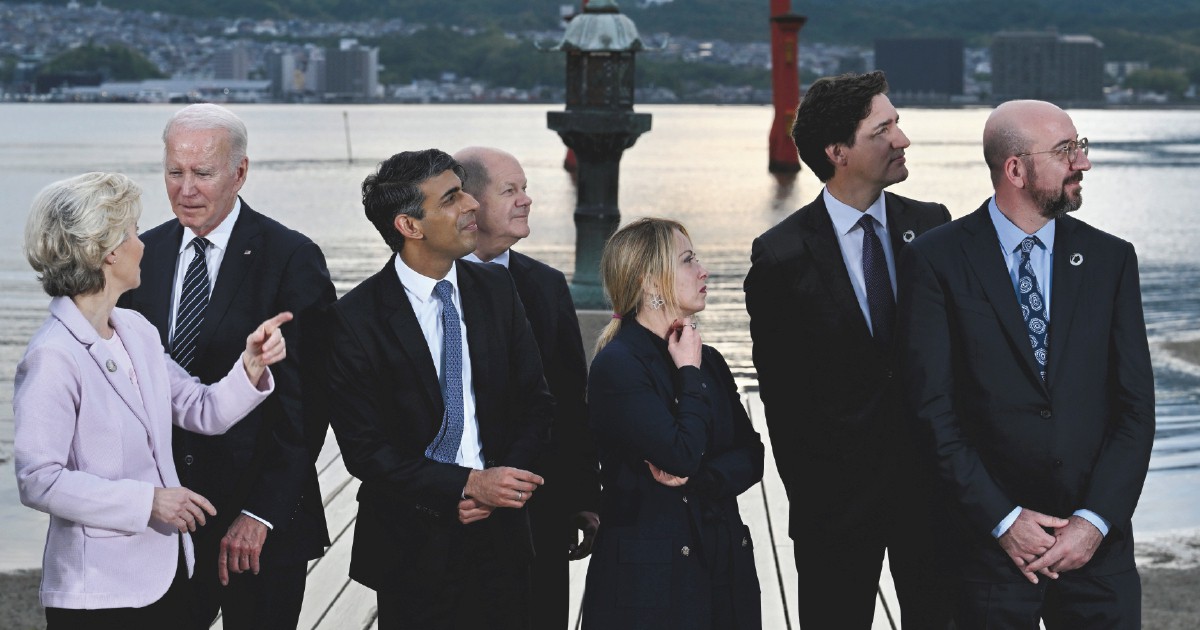by Roberto Iannuzzi *
Last April, a triumphant article byEconomist titled “The lessons from America’s astonishing economic record” claimed that “the world‘s largest economy is leaving its competitors increasingly in the dust”. The inconvenient truth – however observed Graham Allison, one of the leading American political scientists – is that The Economist reaches this astounding conclusion precisely by excluding the only real competitor of the United States: at dinner.
The comparison to which the well-known British weekly limited itself was between the USA and the other G7 countries. In this competition, the United States is not only ahead but is widening its lead. The burning point, Allison points out, is that since the founding of the G7 nearly half a century ago, share of global GDP to which the group contributes has been progressively decreasing. These seven economies, which in the 1970s accounted for more than 60% of world output, today represent only 44% (just 30% when measured at purchasing power parity).
While the decisive challenge in the coming years will be between the US and China, what we are witnessing is a sort of economic “cannibalism” between Western countries. If in 2008 the European Union economy was slightly larger than the American one (16.2 trillion dollars against 14.7), in 2022 the US economy reached 25 trillion while that of the EU and the United Kingdom together did not even touch 20 trillion. The gap continues to widen, and it’s not just a question of living standards. AND’ Europe’s growing dependence on the United States in the fields of technology, energy, finance and defense which is eroding any remaining aspirations of Europe’s “strategic autonomy”.
Read Also
Italians among the most worried about not making ends meet: 80% ask the government for help against inflation. The OECD survey of 27 countries
The European technology landscape is dominated by American companies such as Microsoft, Amazon and Apple. While China has developed its own tech giants, the few European companies that emerge are often bought by the United States. If in 1990 Europe produced 44% of semiconductors worldwide, this percentage dropped to around 9% in 2020. With a share of 12%, the US fares no better. But while Washington fielded an ambitious industrial policy with the provisions of the Inflation Reduction Act (IRA) and the CHIPS and Science Act, the great European aspirations regarding the ecological and digital transition risk remaining on paper.
Faced with the huge industrial subsidies implemented by the IRA, which risk heavily disadvantageing EU industry, the European Commission has shown a disconcerting passivity.
Meanwhile, for the much heralded Green Deal which should cost 620 billion euros, the Commission has allocated just 82.5 billion, suggesting that it will probably remain little more than a slogan. And while the status of world reserve currency enjoyed by the dollar allows Washington to finance its plans, the inherent problems of the European monetary union place much more stringent limits on the EU.
After the fall of the Berlin Wall, it may have seemed for some years that Europe was less dependent on America. But, betting on the eastward enlargement of NATO and the EU, Washington has created a new tank of countries closely linked to the USA, at the same time shifting the center of gravity of the Union and the Atlantic Alliance. Cleverly exploiting the Ukrainian conflict, the United States has imposed again their necessity on the European continent, urging its allies to break all relations with Moscow and to give up low-cost Russian energy sources. This has created a further imbalance between the two sides of the Atlantic. While the US has its own sources of cheap oil and gas, European energy prices have skyrocketed.
The Germania, The engine of EU growth, it has seen its export-based model of prosperity progressively demolished by high inflation and quadrupled spending due to its sudden dependence on expensive US energy sources. This placed the country into a recession. The problem, common to other EU countries, further increases the risk of one migration of European companies on the other side of the Atlantic, and of a progressive deindustrialization of the old continent.
Read Also
Climate crisis, hail after the heat: grains like tennis balls in Veneto. 110 injured, cars and houses damaged. Coldiretti: “Ruined entire campaigns”
Europeans began to become impoverished. Unlike the United States, consumption in Europe is decreasing. The EU now contributes 18% of global consumer spending, compared with a US contribution of 28%. Fifteen years ago, both the US and the EU contributed about a quarter of this expenditure.
Meanwhile, the militarization of Europe as a result of the confrontation with Russia in the absence of a robust European industry of defence, is destined to create further dependence on the American defense industry.
Already before the conflict, about half of European military spending went to enrich the US military-industrial complex. And in light of the competition with Beijing, Washington is putting pressure on European countries to also reduce their trade interests and investments in China. In the panorama of the new global competition, Europe therefore runs the risk of becoming the impoverished rear (if not actually the battlefield) of a declining West.
* Author of the book “If Washington Loses Control. Crisis of American unipolarity in the Middle East and in the world” (2017).
Twitter: @riannuzziGPC
